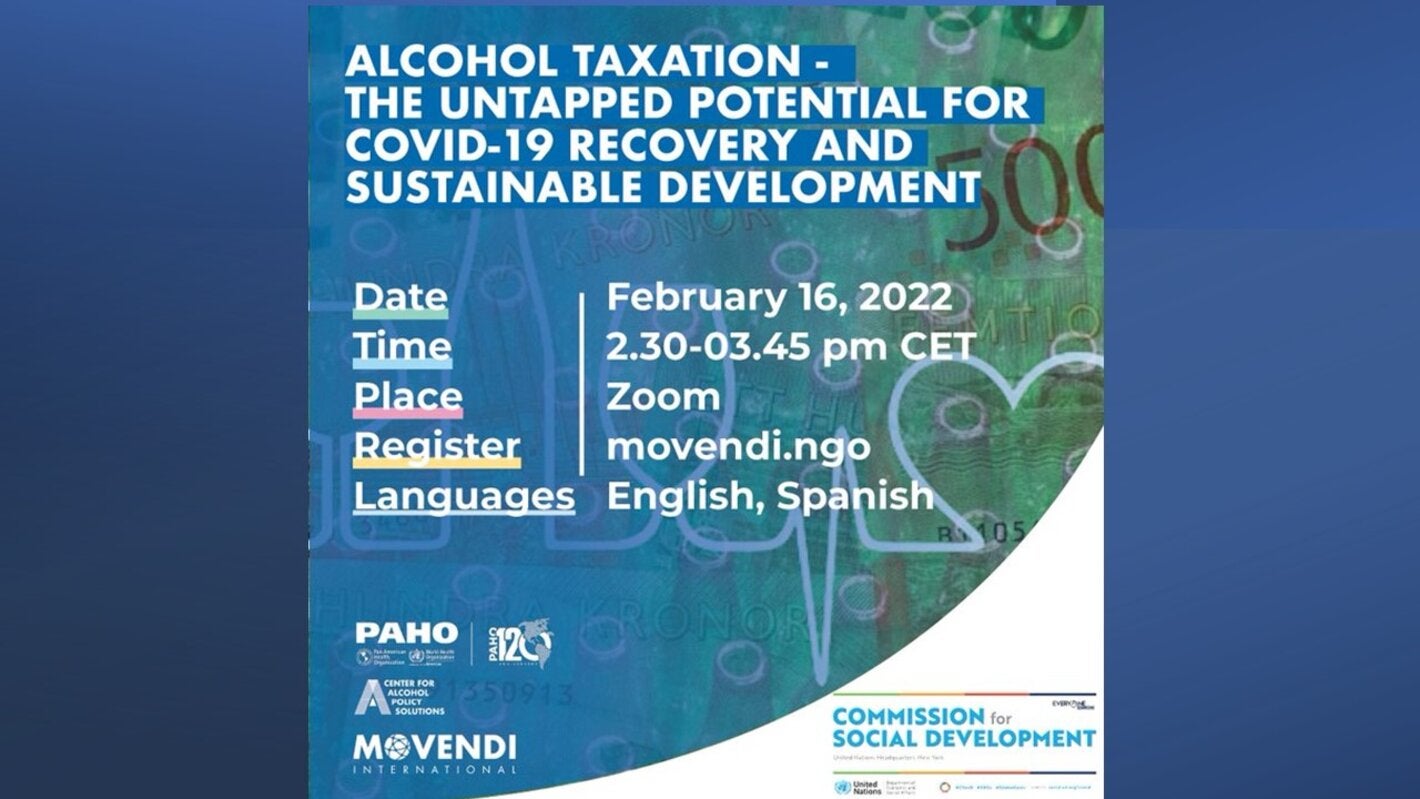
The Pan American Health Organization, Movendi International and the Center for Alcohol Policy Solutions invites you to the side event to the 60th session of the Commision for Social Development (CSocD60) side event that will take place on Wednesday, 16 February 2022, titled "Alcohol Taxation – The Untapped Potential for COVID-19 Recovery and Sustainable Development".
The purpose of this event is to promote a fresh approach, highlight innovative initiatives, and share compelling new evidence about the triple win potential of alcohol taxation for COVID-19 recovery, poverty and hunger eradication, and achieving the SDGs.
How to partipate
- DATE: Wednesday, 16 February, 2022
- TIME: 8:30 am -9:45 pm EST [check below the local time in other cities]
- REGISTER: https://us02web.zoom.us/meeting/register/tZ0odeytqz8pHdIYg0bIo8cxxeNvnUMg6_5f
- LANGUAGES: The session will be in English with Spanishsimultaneous interpretation.
Description
This innovative CSocD60 side event seeks to discuss the lessons learned from experts in tobacco taxation policy to outline the vast untapped potential of alcohol taxation. This groundbreaking side event will explore state of the art evidence for the feasibility and efficacy of alcohol taxation. And it will provide unique and compelling analysis of alcohol as obstacle to the SDGs, and how alcohol taxation facilitates achievement of SDGs such as poverty and hunger eradication, and health system strengthening. This side event will also discuss the opportunities and challenges – in different parts and countries of the world – of developing and implementing evidence-based alcohol taxes.
Background
Alcohol is a major obstacle to development, adversely affecting 14 of 17 SDGs and all aspects of sustainable development. Therefore, SDG 3.5 addresses the need for prevention and treatment and recovery interventions to tackle alcohol harm and foster well-being and development for all.
Three facts about alcohol’s development burden stand out:
- Every ten second a human being dies due to alcohol, adding up to 3 million deaths every year.
- Marginalized and socio-economically poorer people and communities are disproportionately affected by alcohol; for instance, alcohol is the largest risk factor for disease burden in the age group 25-49 years.
- Evidence also shows the lethal interaction between alcohol and the coronavirus pandemic, where alcohol weakens people’s immune systems as well as societies’ health systems – driving the spread of COVID-19 and hampering recovery.
These three facts illustrate the mortality and morbidity burden caused by alcohol, the impact of alcohol on younger, poorer, and socio-economically disadvantaged people and the urgent need to tackle alcohol harm as a key obstacle to recovery from COVID-19.
But a triple win solution is available, is well proven scientifically, and is increasingly sought after by countries around the world: evidence-based, public health oriented, alcohol excise taxation.
Program and speakers
Kristina Sperkova, International President, Movendi International will open the event, set the scene and moderate:
- Setting the scene: Alcohol as obstacle to the SDGs – with focus on SDGs 1, 2, and 3
- Alcohol Taxes in Latin America and the Caribbean: challenges and opportunities
- Dr. Maristela Monteiro, Pan-American Health Organization
- State of the art evidence for and potential of alcohol taxation
- Dr. Evan Blecher, World Health Organization
- How Thailand uses alcohol and tobacco taxation to achieve the SDGs
- Dr. Supreda Adulyanon, Thai Health Promotion Foundation
- Using alcohol taxes to support public health and fiscal resilience in a pandemic context
- Dr. Sheila Dutta, World Bank
- The need for alcohol policy to drive development
- Dr. Rohan Ratnayake, Ministry of Health, Sri Lanka
- The triangle that moves the mountain: how civil society supports the development of alcohol taxation in Sri Lanka
- Mr. Pubudu Sumanasekara, Center for Alcohol Policy Solutions
- Alcohol Taxes in Latin America and the Caribbean: challenges and opportunities
Time correspondence
- 6:30 am.– Los Angeles
- 7:30 am. – Belmopan, Guatemala City, Mexico City, Managua, San José (CR), San Salvador, Tegucigalpa
- 8:30 am. – Bogota, Havana, Kingston, Lima, Panamá City, Quito, Port-au-Prince, Washington DC
- 9:30 am. – Bridgetown, Caracas, Castries, Georgetown, La Paz, Nassau, Port of Spain, San Juan
- 10:30 am – Asunción, Buenos Aires, Brasilia, Montevideo, Paramaribo, Santiago
- 2:30 pm. – Geneva, Madrid
